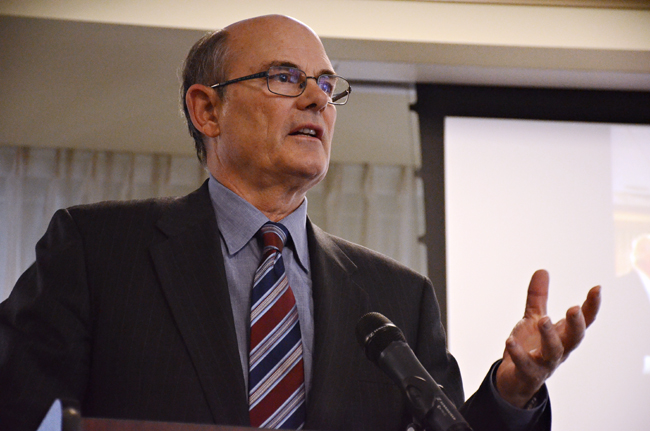Retired Gen. Montgomery Meigs spoke Tuesday at Westminster, a retirement community, about his service and the future of the United States.
Meigs delivered his speech to a room full of retired military personnel — many of whom were UT alumni — in honor of Veterans Day. He said those who serve make a decision to fight for something larger and more important than themselves.
“The important thing about veterans is the decision that you make en route to harm’s way,” Meigs said. “Most of the time, you make an intellectual decision that your interests and survival are subordinate to the success or failure of your organization.”
Cmrd. Miller Hicks said Veterans Day and Memorial Day go hand in hand. He said while it is important to never forget those who served, it is even more important to give mind to those who were wounded or killed in the line of duty.
“On the 26th of May, we celebrated Memorial Day, and that was the day we honored all who had paid the ultimate price in defending our freedoms,” Hicks said. “I wear on my lapel a ribbon for the wounded warriors. They were men and women who came back wounded in body or spirit.”
Hicks said veterans have historically stepped up in times of need to protect the country — despite the cost to themselves and their families.
“Thousands have faced harms way in wartime — thousands,” Hicks said. “Many have stood by and waited, not to get in service, but waited to be called when needed. They also served.”
In addition to thanking the many veterans in attendance, Meigs spoke about the threats currently enlisted military personnel face in the changing world, beginning with the emergence of the Islamic State group. He said he does not believe it’s correct to refer to the group as a “state.”
“We have a new type of threat in ISIS,” Meigs said. “I won’t call it the Islamic State because it’s not a state. It is a criminal, aggressive, distributive public movement.”
Davis Ford, who authored a book about Earnest Gloyna, was also in attendance. Gloyna, a former professor and dean at the engineering school, fought in World War II. Ford said listening to the stories veterans have to tell is important in keeping history alive.
“The worst thing that can happen is a person that has a long history dies without recordation,” Ford said. “It’s gone forever.”


















